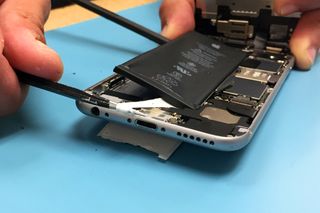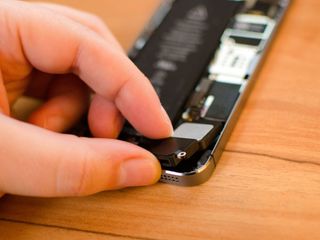
According to French website iGen, as first reported by MacRumors, Apple's new policy regarding fixing iPhones is that, if it has an after-market battery in it, they will still work on it.
If the repair is unrelated to the battery, the Genius Bar and AASPs are now instructed to ignore the third-party battery and proceed with service as normal, according to Apple's internal document. This could include repairs to the display, logic board, microphones, and so forth, with normal fees applying.
Previously, Apple technical support was told that, if an iPhone had a third-party battery, they were to deny the repair service, even if the repair had nothing to do with the battery.
MacRumors corroborates iGen's discovery with internal Apple documents.
If the repair is related to the battery itself, the Genius Bar and AASPs are now permitted to replace the third-party battery with an official Apple battery for the standard fee. Before starting the repair, the Genius Bar must drain the third-party battery to less than 60 percent of a charge.
Additionally, the repair technician can, at their own discretion, replace a battery if "tabs are broken or missing, or there is excessive adhesive" for the cost of the battery replacement, instead of the entire iPhone, as was previous policy procedures.

If you listen regularly to the iMore Show you may have heard me discussing how I feel about a consumer's right to repair. In fact, in one particular episode, Georgia Dow, Rene Ritchie, and I have a lively discussion about it.
I can understand how important it is for companies like Apple and Samsung to maintain high standards in their hardware, and once you plop some third-party bits into it, there is no longer a guarantee of high quality. But as the purchaser of this hardware, I feel I have the right to lower the quality of the device at my own discretion. If, for example, I replace a cracked screen at a third-party screen repair shop, and then need to have the Lightning port of my iPhone worked on by Apple, my repair service should not be denied just because my screen wasn't repaired by them.
If you own your phone outright, you should have the right to take it into any shop you choose for repairs.
We're not leasing our iPhones (unless you're in the iPhone Upgrade Program, of course). I am of the opinion that, if you own your phone outright, you should have the right to take it into any shop you choose for repairs without it negatively affecting your ability to continue to receive support from official technicians.
Master your iPhone in minutes
iMore offers spot-on advice and guidance from our team of experts, with decades of Apple device experience to lean on. Learn more with iMore!
It wouldn't be entirely unlike being turned away by your dealer for a tune-up because you took your car to a Goodyear tire shop to fix a flat.
As important as consumer protection is, it's also just as important for manufacturers of these devices to be protected from fault if a third-party repair shop does something to compromise the hardware.
If, for example, you took your phone to a third-party repair shop to fix a Touch ID issue, and then your Home button stops working altogether, Apple shouldn't be at fault for replacing your phone.
I believe, however, that there is a way that consumers and companies can come to a collective agreement on the best way to allow us to make our own choices as to whom we want to repair our devices, while protecting companies from having to perform extraneous repairs due to a botched service at a third-party shop. Open discussion and a willingness to work together is key to finding a healthy compromise.
In a statement to MacRumors, iFixit director of communications Kay-Kay Clapp said:
This decision proves that now, more than ever, the third-party repair ecosystem is an integral part of maintaining Apple's high-quality customer experience. If Apple is getting enough third-party repaired phones for a policy change, they clearly don't have the reach or capacity to maintain all the iPhones that they've sold. All of us, including Apple, benefit from the service provided by the repair community.
Apple allowing its repair technicians to work on iPhones with aftermarket batteries is a huge step toward giving consumers more autonomy over devices they own outright. It's a great experiment in whether this could work. Apple, as usual, sets an example that other companies might (and hopefully will) follow with their own repair programs.
How do you feel about a consumer's right to repair their own devices? Do you think companies should continue their current repair service policies or open up to allowing more flexibility with third-party repairs?
Learn more about the right to repair from the Repair Association or check out iFixit's grassroots innitiative.
Share your thoughts with me in the comments.
Lory is a renaissance woman, writing news, reviews, and how-to guides for iMore. She also fancies herself a bit of a rock star in her town and spends too much time reading comic books. If she's not typing away at her keyboard, you can probably find her at Disneyland or watching Star Wars (or both).
Most Popular




